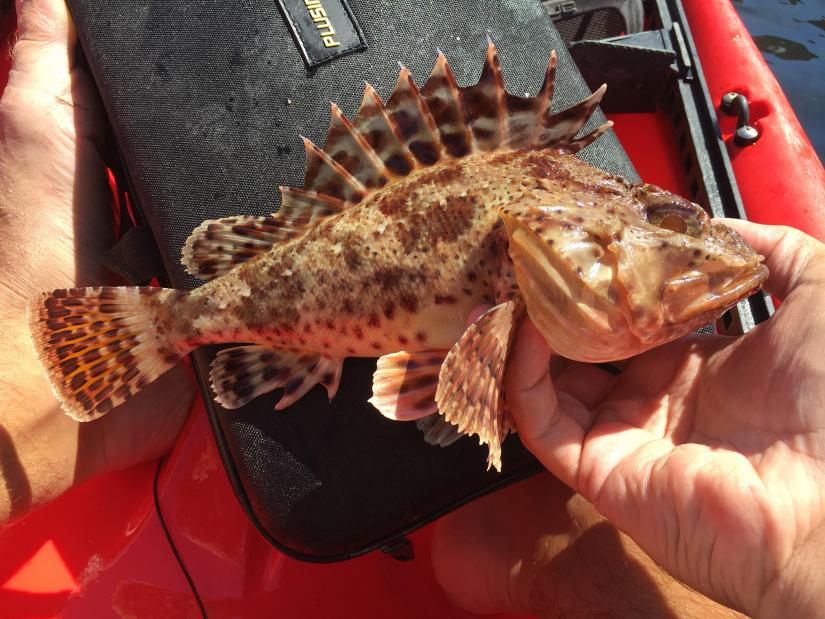California Scorpionfish
Scorpaena guttata
The Science
THE SCIENCE
Has venomous spines! In fact, the genus name comes from the Greek word for "scorpion".

Taxanomic description
- The California scorpionfish has a stocky, slightly compressed body, a large head, mouth, and large pectoral fins. [1]
- Its colors range from red to brown with dark blotches and spotting on the body and fins. [1]
- Usually mature by 17 cm (6.7 inches), and can grow up to 43 cm long (16.9 inches). [2]
Distribution
- Found between Uncle Sam Bank, Baja California, and Santa Cruz, California. There is an isolated population in the Gulf of California. [1]
- More common along the southern part of California's coast than in the north. [8]
Life history
- Can live up to about 21 years, and spawns when it is 3 to 4 years old. [1]
- Spawning season takes place from April through August, and mating occurs through external fertilization. [1]
- Females release gelatinous "balloons" filled with eggs that float from the bottom to the surface, and these eggs hatch in about 5 days after the "balloons" are released. [1]
- Each egg ballon is about 12.7-25.4 cm (5-10 inches) long and joined at their small ends. [1]
Habitat
- Usually found over hard, rocky bottoms at depths from just below the surface to 600 feet, but is occassionally found over sand or mud bottoms. [1]
- Prefers a depth range from 6.1-137.16 m (20-450 feet), and is believed to be more active at night. [4]
- Diet includes crab, squid, octopus, fishes, and shrimp. [1,2]
- Predation of this fish is believed to be low, but predation by octopi and sharks have been recorded. [4]
The Fishery
THE FISHERY
Often mistakently called sculpin, this fish is commonly caught by hook and line, and it is a very popular sportfish

Seasonal availability
- Depending on the region and method of catch, there may be some seasonal closures. However, commercial fishing for this fish is generally allowed year-round. [3]
Regulatory and managing authority
- This fishery is managed federally by the NOAA fisheries and, as established by the Magnuson-Stevens Act, the Pacific Fishery Management Council (PFMC) through the Pacific Coast Groundfish Fishery Management Plan (FMP). [4,17]
- As established by the Marine Life Management Act, the California Fish and Game Commission (CFGC) regulates the fishery in state waters, and the California Department of Fish and Wildlife (CDFW) manages this fishery through the California Nearshore Fishery Management Plan (NFMP). [18]
- The California Groundfish Collective combines input from the industry and government entities to inform regulatory and management measures for this fishery. [19]
Gear type
- Usually caught by hook and line, but is also caught by fish pot, trawl, gill net. [4]
- Also taken as bycatch in rockfish fisheries. [4]
Status of the fishery
- A 2017 assessment by the Pacific Fishery Management Council found that the stock of Southern California scoprionfish is above the biomass target and above the minimum stock size threshold. [4]
- There is still much uncertainty about the California scorpionfish, but commercial landings have fluctuated over time, possibly from El Niño events. [4]
Potential ecosystem impacts
- Because of a lack of data, the environmental impacts of fishing the California scorpionfish are still widely unknown. [4]
- As of 2017, this fish is not considered overfished. [4]
- The environmental impacts associated with different fishing strategies (e.g. habitat disturbance, bycatch) should apply. [9]
The Seafood
THE SEAFOOD
This fish has a mild flavor and tastes great fried!


Edible portions
- Typically only the fillet is consumed, but the whole fish can be consumed (minus the venemous spines).
Description of meat
- California scorpionfish has a white, firm meat similar to cod and can be prepared many ways. [5]
Culinary uses
- Popular recipes include broiling, pan-searing, grilling, and frying. [5,6]
- For a recipe for Catalonian fish soup, visit Fish Tales. [11]
- For a recipe for Libyan Couscous with fish, visit Libyan Food. [20]
Nutritional information
- Nutritional information for 100g of raw rockfish can be found on the table to the right. [10]
Toxicity report
- California scorpionfish earns its name--its spines have venom that can cause intense pain if they prick you! However, their venom does not usually kill humans. [1]
- When handling this fish, hold it by the mouth to avoid getting pricked. [7]
Seasonal availability
- This fish is available year-round. [3]
References
[1] California Department of Fish and Wildlife. California Marine Sportfish Identification: Rockfish. 2013. Web. https://wildlife.ca.gov/fishing/ocean/fish-id/sportfish/rockfish. Accessed 29 Jan 2020.
[2] Love, Milton S., et al. “Life History and Fishery of the California Scorpionfish, Scorpaena Guttata, within the Southern California Bight.”. 1987. Fishery Bulletin, vol. 85, no. 1.
[3] NOAA Fisheries. 2019. PACIFIC COAST GROUNDFISH FISHERY 2019–2020 Harvest Specifications and Commercial and Recreational Management Measures Final Rule. Web. https://archive.fisheries.noaa.gov/wcr/publications/nepa/groundfish/mis…. Accessed 15 July 2020.
[4] Monk, Melissa H., et al. Status of California Scorpionfish (Scorpaena Guttata) Off Southern California in 2017. 2018. Web. https://www.pcouncil.org/documents/2017/09/e8_att11_ca_scopionfish_exec…. Accessed 29 Jan 2020.
[5] Godwin, Christopher. Our Everyday Life. How to Cook Sculpin Fish. Web. https://oureverydaylife.com/470749-how-to-cook-sculpin-fish.html. Accessed 3 Jan. 2020.
[6] Jones, K. 2011. KenJones. California Scorpionfish: When a sculpin is not a sculpin? Web. http://kenjonesfishing.com/2011/07/when-is-a-sculpin-not-a-sculpin/. Accessed 15 July 2020.
[7] Hayashi, Jason. BD Outdoors. 2015. Removing Sculpin Spines - California Scorpionfish. https://www.bdoutdoors.com/removing-sculpin-spines/.
[8] Froese, R., Garilao, C.V. n.d. Fishbase. Scorpaena guttata. Web. https://www.fishbase.se/summary/3943. Accessed 15 July 2020.
[9] Monterey Bay Aquarium Seafood Watch. n.d. Fishing and Farming Methods. Web. https://www.seafoodwatch.org/ocean-issues/fishing-and-farming-methods. Accessed 15 July 2020.
[10] Self. n.d. Fish, rockfish, Pacific, mixed species, raw. NutritionData. Web. https://nutritiondata.self.com/facts/finfish-and-shellfish-products/409…. Accessed 20 July 2020.
[11] Fish Tales. n.d. Catalonian traditional scorpionfish suquet. Web. https://www.fish-tales.com/recipe/cod/catalonian-traditional-scorpionfi…. Accessed 24 July 2020.
[12] alwayslaurenj. flickr. 2018. Photo of California Scorpionfish resting on kelp. Digital image. Web. https://www.flickr.com/photos/25831752@N04/42655241180/. Accessed 17 December 2020.
[13] Mason, G. flickr. 2013. Photo of California Scorpionfish on substrate. Digital image. Web. https://www.flickr.com/photos/gregmason/8586819505/. Accessed 17 December 2020.
[15] Reddit. 2017. Photo of California scorpionfish. Digital image. Web. https://www.reddit.com/r/Fishing/comments/6ilq70/california_scorpionfis…. Accessed 24 July 2020.
[16] Kurylo, V. n.d. Cooked fresh red scorpionfish sarved with boiled potatoes in the greek tavern. Digital image. Web. https://www.shutterstock.com/image-photo/cooked-fresh-red-scorpionfish-…. Accessed 23 December 2020.
[17] Pacific Coast Groundfish Fishery Management Plan. 2019. Pacific Fishery Management Council. Web. https://www.pcouncil.org/documents/2016/08/pacific-coast-groundfish-fis…. Accessed 21 August 2020.
[18] Nearshore Fishery Management Plan. n.d. California Department of Fish and Wildlife. Web. https://www.wildlife.ca.gov/Conservation/Marine/NFMP. Accessed 21 August 2020.
[19] The Nature Conservancy. 2015. The California Groundfish Collective. Web. http://www.cagroundfish.org/#our-story. Accessed 2 December 2020.
[20] Libyan Food. 2011. Libyan Couscous with Fish: Kusksi bil Hoot. Web. https://libyanfood.blogspot.com/2011/02/couscous-with-fish.html. Accessed 11 December 2020.



